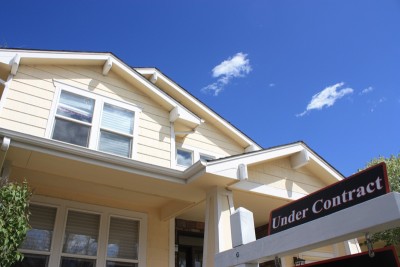House Bill 16-1334 would allow Colorado counties to impose inclusionary zoning in unincorporated areas. The bill is an effort to mandate “affordable” housing for “low- and moderate-income households.” But inclusionary zoning actually turns some people into second-class citizens and makes housing less affordable for everyone else.
Cities with inclusionary zoning ordinances such as Boulder and Denver typically require developers to sell 10 to 20 percent of the homes they build to low-income families at below-market prices. Research shows that developers respond to such mandates by building fewer homes in cities with such laws and by charging more for the market rate homes they do build to make up for their losses on the “affordable” homes.
![]() Since the sale price of existing homes depends partly on the price of new homes, when inclusionary zoning causes new home prices to rise, existing home prices rise as well. Thus, inclusionary zoning makes housing less affordable for everyone except the lucky few who get to buy a subsidized home.
Since the sale price of existing homes depends partly on the price of new homes, when inclusionary zoning causes new home prices to rise, existing home prices rise as well. Thus, inclusionary zoning makes housing less affordable for everyone except the lucky few who get to buy a subsidized home.
In lieu of selling some homes at below-market prices, Boulder and Denver “allow” developers to pay into an affordable housing fund. Developers pass this cost on to the buyers of new homes. Every homebuyer except for the subsidized few ends up paying more.
The people who benefit from inclusionary zoning are truly few in number. From 2010 to 2015, less than 100 “affordable” homes were built in Denver as a result of the city’s inclusionary zoning ordinance.
Nor are the buyers of such homes as lucky as would first appear. The homes come with strings attached. When they are ready to move, they often can only sell their homes to other low-income families, and not for more than the price they paid for it plus a small percentage increase to account for inflation. HB 1334 allows for counties to specify “a time period for which affected housing units are required to stay affordable.”
Rather than truly own their home, they are more like feudal tenants who live in the home at the pleasure of the government.
“Buyer BEWARE!! ought to be stamped on every deed attached to an inclusionary residence,” says former Denver City Council member Susan Barnes-Gelt. “Regulations limit appreciation, there is no floor in a tumbling economy. Rental restrictions preclude owner flexibility as do shifting interest rates and lending requirements.”
Barnes-Gelt sponsored Denver’s original inclusionary ordinance in 2002, but ended up opposing an expansion of the ordinance in 2014, writing in the Denver Post, “More carrots, more sticks and greater flexibility in an unsound and ineffective policy is not progress.”
Another former Denver City Council member, Charlie Brown (who voted against the ordinance in 2002) called it “the worst law we ever passed.”
Inclusionary zoning can’t solve the Denver area’s housing affordability problem because it doesn’t address the real cause of that problem: the urban-growth boundary drawn around Denver-area cities and even tighter restrictions on Boulder. Thanks to Boulder’s greenbelt and other land-use restrictions, Boulder has made itself so unaffordable that low-income families are forced out.
Similarly, inclusionary zoning can’t solve housing affordability issues in counties with restrictive land-use policies.

Moreover, inclusionary zoning may very well run afoul of the law.
A recent U.S. Supreme Court decision found that land-use policies that make housing less affordable for low-income minorities potentially violate the federal Fair Housing Act, even if they were not designed to discriminate against those minorities. This is known as “disparate impact.” Such policies are acceptable only if needed to achieve a “legitimate” goal and there is no other way to achieve that goal without making housing less affordable.
For example, a policy requiring urban residents to connect their homes to sewer systems makes homes a bit more expensive but is legitimate because it protects public health. A policy of making housing more expensive for the majority of low-income families by mandating and subsidizing housing for a small few is less likely to be legitimate.
According to census data, between 2000 and 2010, the share of white families in single-family homes in Denver declined from 69 to 68 percent, but the share of black families in single-family homes declined from 54 to 46 percent. Where the white homeownership rate fell by 4 percent, the black homeownership rate fell by 12 percent. This is in a city that has long practiced inclusionary zoning.
Inclusionary zoning modestly benefits a few chosen families, but it does nothing to make housing more broadly affordable.
It is bad enough that some Colorado municipalities mandate this discriminatory, and ultimately detrimental tool. The legislature would be wise to avoid giving that same authority to counties.
Randal O’Toole (rot@i2i.org) is the director of the Independence Institute’s Transportation Policy Center and author of American Nightmare: How Government Undermines the Dream of Homeownership.


